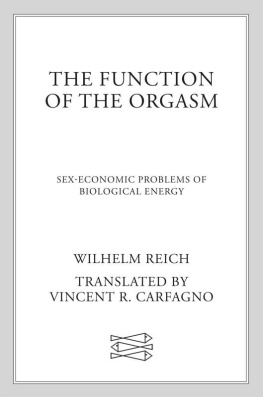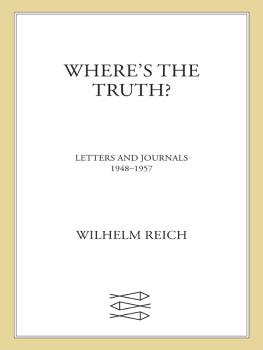The author and publisher have provided this e-book to you for your personal use only. You may not make this e-book publicly available in any way. Copyright infringement is against the law. If you believe the copy of this e-book you are reading infringes on the authors copyright, please notify the publisher at: us.macmillanusa.com/piracy.
Contents
I.
II.
III.
IV.
V.
VI.
VII.
VIII.
IX.
Love, work and knowledge are the well-springs of our life. They should also govern it.
WILHELM REICH
PREFACE TO SECOND EDITION
The discovery of the orgone was the result of the consistent, clinical application of the concept of psychic energy, initially in the field of psychiatry. The present volume can be considered an extensive introduction to the newly opened field of orgone biophysics. The results of biophysical and physical research since 1934 were set forth in special treatises in the International Journal for Sex-economy and Orgone Research (19425). In the near future, they will be collected and published as Volume II, under the title The Cancer Biopathy. It has been clearly shown that knowledge of the emotional functions of biological energy is indispensable for the understanding of its physical and physiological functions. The biological emotions which govern the psychic processes are themselves the direct expression of a strictly physical energy, the cosmic orgone.
The second edition of this book appears unchanged.
W. R.
New York
February 1947
GENERAL SURVEY
This book comprises my medical and scientific work on the living organism over the course of the past twenty years. It was not initially intended for publication. Thus, I had no hesitation in expressing what I might otherwise have left out owing to material considerations, good reputation in the general sense of the word, and some still unresolved trains of thought.
To most people, it is a riddle that I can be active simultaneously in disciplines as different as depth psychology, sociology, physiology, and now even biology. Some psychoanalysts wish that I would return to psychoanalysis; the sociologists relegate me to natural science and the biologists to psychology.
The subject of sexuality virtually cuts through all scientific fields of research. In the central phenomenon, the sexual orgasm, we meet with questions deriving from the field of psychology as well as from that of physiology, from the field of biology no less than from that of sociology. Natural science offers hardly another field of research that is so well equipped to exhibit the fundamental unity of everything that lives and to guard against narrow, fragmentizing specialization. Sex-economy became an independent discipline, having its own methods of research and its own body of knowledge. It is a natural-scientific, empirically founded theory of sexuality. Now it has become essential to describe its development. In doing so, I am very happy to be able to take the opportunity to clear up what I can claim as my own contribution, how my work is related to other fields of research, and what is concealed behind the hollow rumors about my activity.
Sex-economy grew in the womb of Freuds psychoanalysis between 1919 and 1923. The material separation from this matrix took place around 1928, but it was not until 1934 that it was severed from the International Psychoanalytic Association.
The present volume is more a relation of facts and events than it is a textbook. A systematic presentation of the material could not have shown the reader how, in the course of these twenty years, problems and solutions followed one upon the other. Nothing could have been contrived; everything owes its existence to the remarkable course of scientific logic. It is not false modesty when I say that I feel myself to be merely the instrument of this logic.
The functional method of research acts like a compass in an unfamiliar region. I do not know of any finer proof of the validity of the sex-economic theory than the circumstance that the orgastic potency discovered in 1922, the most important element of sex-economy, led to and found its natural-scientific substantiation in the discovery of the orgasm reflex (1935) and orgone radiation (1939). This inherent logic in the development of sex-economy is its fulcrum in a welter of opinions. It is its citadel in the struggle against misunderstandings and in the overcoming of grave doubts at a time when confusion threatens to stifle clear thinking.
There are certain advantages in writing scientific biographies in ones younger years. Some of the illusions one still has during that period, namely that people will be prepared to accept revolutionary insights, enable one to stick to the basic facts, to resist the manifold temptations to make compromises and not to shy away from incisive conclusions for the sake of intellectual complacency, peace of mind, or worldly acceptance. The temptation to deny the sexual etiology of so many illnesses is far greater in the case of sex-economy than it was in psychoanalysis. It was only with great effort that I succeeded in establishing the term sex-economy. This concept is intended to cover a new scientific field: the investigation of biopsychic energy. According to the prevailing view of life, sexuality is an offensive term. It is very tempting to wipe out its importance for human life altogether. It will no doubt require the work of many generations before sexuality is taken seriously by official science and the laity, probably not until the social questions of life and death bear in upon us the absolute necessity of comprehending and mastering the sexual process, free of social constraints.
One such question is cancer; another is the psychic plague which gave rise to dictatorships.
Sex-economy is a natural-scientific discipline. It is not ashamed of the subject of sexuality, and it rejects as its representative everyone who has not overcome the inculcated social fear of sexual defamation. The term vegetotherapy, used to describe the sex-economic therapeutic technique, is actually a concession to the squeamishness of the world in sexual matters. Orgasmotherapy would have been a much better, indeed more correct term, for this medical technique: that is precisely what vegetotherapy basically is. It had to be taken into consideration, however, that this term would have entailed too great a strain on the young sex-economists in their practice. Well, it cant be helped. Speak of the core of their natural longings and religious feelings and people will either laugh derisively or snicker sordidly.
There is reason to fear that in a decade or two, the school of sex-economists will split up into two mutually hostile groups. One group will claim that the sexual function is subordinate to the general functions of life, and hence of no real account. The other group of sex-economists will raise a strong, radical protest and attempt to save the honor of research on sexuality. In this controversy, the fundamental identity between sexual process and life process could become totally obscured. I, too, could give in and deny what was an honest scientific conviction in my younger years of struggle. For there is no reason to suppose that the fascist world will cease to threaten our difficult work with annihilation through moralistic, hereditary-oriented psychiatrists and party bureaucrats, as it has done and continues to do. Those friends who are familiar with the Norwegian scandal created by the fascist press campaign against sex-economy know what I mean. Without delay, therefore, it is imperative to establish what is meant by sex-economy, before I myself begin to think otherwise under the pressure of obsolete social conditions and obstruct with my authority the search for truth of future young scientists.
The theory of sex-economy and its investigation of living phenomena can be stated in a few sentences.
Next page


